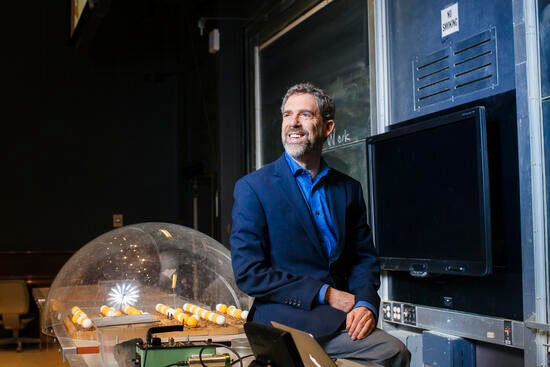Kenneth Barish, a professor of physics and astronomy at UC Riverside, has been elected the chair of the STAR Council for a two-year term beginning March 2025.
The STAR Experiment is run at the Relativistic Heavy Ion Collider, or RHIC, at the Brookhaven National Lab in Upton, New York. The Solenoid Tracker at RHIC, known as STAR, is the only major experiment currently operating at RHIC and tracks thousands of particles produced in high-energy heavy-ion collisions at the collider.

STAR is composed of 74 institutions from 14 countries, with a total of 770 collaborators. The STAR Council, which deals with general issues that concern the collaboration, is the governing and policy-making board of the collaboration. The spokesperson and council chair are the two major leadership roles in the collaboration.
“I am flattered to be nominated to run as the STAR Council chair and honored to serve,” Barish said. “STAR’s physics output has been truly remarkable, and some of the most consequential results will come from data taken in the last three years.”
The STAR experiment aims to study the characteristics of a form of matter called quark-gluon plasma, the detection of which would allow physicists to better understand the universe in the moments after the Big Bang. Further, the experiment studies the spin structure of the nucleon utilizing polarized proton-proton collisions.
According to Barish, maintaining a well-functioning and productive collaboration after the completion of data-taking will be essential but also pose challenges as collaborators increase their activities on other projects.
“At the same time, there are opportunities given that the continued analysis of STAR data will be essential for early career scientists who are also working toward the Electron-Ion Collider and other long-range projects,” he said. The Electron-Ion Collider is a planned major nuclear physics research facility at Brookhaven National Lab. “The Council will play a critical role in this transition as we consider post-data-taking members in good standing and other policies to ensure that the physics potential of this data is fully realized and archived to allow for analysis years in the future.”
Barish joined STAR and became a member of the council in 2016. He was STAR’s deputy spokesperson from 2020-23. He served as chair of the Department of Physics and Astronomy for six years and is currently the chair of the UCR Academic Senate.